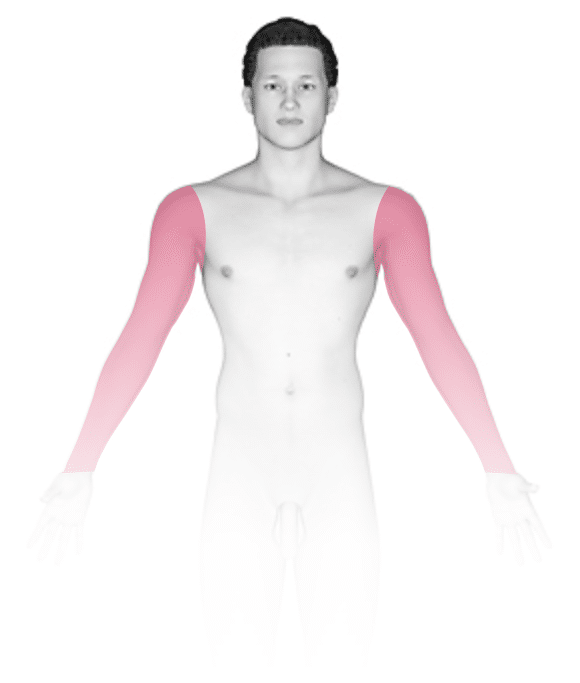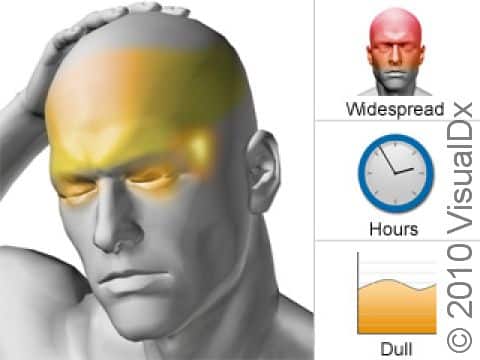Tension Headache
Tension headache typically involves on-and-off head discomfort that is described as mild to moderate. It may feel like a nonthrobbing “tightness” or “pressure,” often on both sides of the head. People with a tension headache find they can usually go about their regular daily activities. Unlike with migraine, nausea, vomiting, and light and sound sensitivity are uncommon with tension headache.
Tension headaches last from 30 minutes to several days. When tension headaches occur 15 or more days a month, they are considered chronic tension headaches. People who regularly use pain medications for tension headaches may develop chronic tension headache or medication overuse headache.
Who's At Risk?
Tension headaches are slightly more common in women than men. They usually start between ages 20 and 30 years. Tension headaches usually become less frequent as you get older. People with fatigue, stress, depression, and anxiety are at higher risk of having tension headaches.
Signs & Symptoms
Tension headache is usually described as a nuisance that does not stop people from doing their daily activities. However, sometimes tension headaches can interfere with concentration, lessen appetite, and cause irritability. Tension headaches often involve large portions of the head, frequently starting and often staying in the back of the head, neck, and shoulders, with a band-like sensation of pressure in these areas.
Self-Care Guidelines
Taking ibuprofen (eg, Advil, Motrin), naproxen (eg, Aleve), aspirin (eg, Bayer), or acetaminophen (eg, Tylenol) usually helps relieve tension headache. Taking a pain reliever with caffeine works best for some people. Note, though, that if your tension headaches become regular (2-3 times a week), these medications can contribute to worsening of your headaches. For this reason, if headaches are frequent, even over-the-counter medications such as ibuprofen or acetaminophen should only be taken under guidance by a medical professional.
Treatments
Lifestyle changes are very important in treating tension headaches. The goal is to avoid headache triggers. Learning about tension headaches, knowing what to expect, and keeping in touch with your medical professional are key to success in controlling symptoms.
Treatments and strategies that can reduce tension headaches include:
- Physical therapy to work on posture and relax neck, shoulder, and back muscles.
- Addressing anxiety and depression.
- Learning how to control frustration and anger through relaxation therapies, hypnosis, or biofeedback.
- Adjusting habits that may be contributing to headaches (eg, obesity, snoring, poor diet, poor sleep habits, sedentary lifestyle).
- Monitoring your diet for food triggers and eliminating caffeine.
- Avoiding medication overuse.
- Cognitive-behavioral therapy, which is talk therapy with a trained counselor, designed to identify stressors and develop coping strategies to minimize their effects.
Your medical professional may prescribe medication to be taken daily for several months and increased gradually, if necessary, with the aim to eventually taper them off. If these are not effective, your medical professional may prescribe a migraine-preventive medication.
Visit Urgency
Most tension headaches are harmless and do not become chronic. However, more serious medical conditions, such as brain tumors and inflammation of blood vessels, can sometimes resemble tension headaches. If you develop a new headache that is different from past headaches and changes or won’t go away, see your medical professional.
See your medical professional if you find you need to take over-the-counter medications more than 2-3 times per week because this can cause medication overuse headaches. Additionally, if your headaches are frequent enough to be considered chronic (ie, you have headaches 15 or more days per month), contact your medical professional.
Also, contact your medical professional if:
- You develop new symptoms not typical of prior headaches.
- A particularly severe headache occurs.
- You feel disoriented or lose consciousness.
- Your headache lasts longer than 3-4 days (unless this is typical for you).
- Your current treatments or medications are not working.
- Your headache is interfering with your daily activities (eg, eating, bathing, working).
Immediately seek medical care if you or someone you are caring for experiences:
- Stiff neck and a high fever with a headache.
- Loss of motor function (eg, your muscles don’t move normally), inability to think clearly, or convulsions with a headache.
- A head injury.
Last modified on October 7th, 2024 at 1:33 pm

Not sure what to look for?
Try our new Rash and Skin Condition Finder
